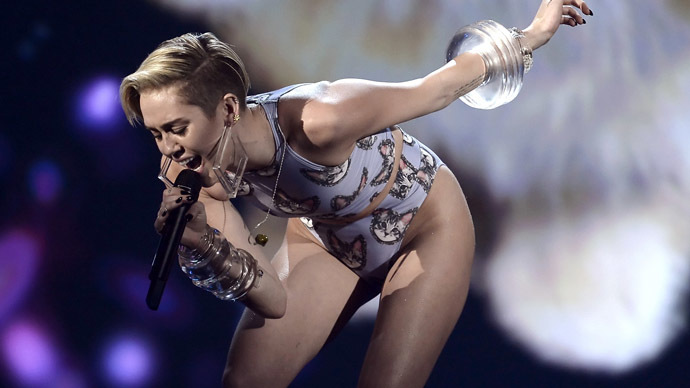Pleasure principle: Our selfie-obsessed lifestyles twerking against us

‘Selfie’ has been named ‘Word of the Year’ by the Oxford Dictionary, an award that underscores the notion that we’re fast becoming a wired-up, dumbed-down society of egomaniacs.
(Warning: The writer of this
article has fuzzy recollections of a ‘golden age’ of rotary dial
phones, vinyl records and fax machines, a time when human
behavior was not determined by the available technology).
What is a ‘selfie’? The gatekeepers of English vernacular at Oxford defined it as "a photograph that one has taken of oneself, typically with a smartphone or webcam and uploaded to a social media website." The trend has become so popular that celebrity watchers, armed with the latest handheld technology, no longer want outdated autographs. Instead, they push and shove to pose alongside any superstar - from Angelina Jolie to the Pope.
On the surface, and despite faint echoes of masturbatory excesses, an occasional ‘selfie’ seems harmless enough (Not always, however, as former US Congressman Anthony Weiner discovered in 2011 when he tweeted sexually suggestive photos of himself, thereby effectively ending his political career). However, taken in context of the runner-up words of the year, some people will argue that social and cultural norms are in a death spiral, a race-to-the-bottom of the public pool in the name of intensely egoistic pursuits.
The OED’s runner-up word of the year was none other than ‘twerking’, a portmanteau that combines ‘twist’ and ‘jerk,’ with special emphasis on the jerk. According to the Oxford word police: twerking refers to a person who dances “to popular music in a sexually provocative manner involving thrusting hip movements and a low, squatting stance." Sounds harmless enough, right?
The world got its first real taste of twerking at the MTV
Video Music Awards in August when pop singer Miley Cyrus, the
former Disney child star, belted out the lyrics while feigning
sexual arousal courtesy of a giant foam finger. When that stage
prop got old, she ‘twerked’ her buttocks against the totem crotch
of married and middle-aged co-star Robin Thicke (since words
alone cannot really capture the magical moment of Cyrus’ official
fall from grace, better watch it for yourself). Keep in mind that
this misguided star has over 15 million followers on Twitter
alone, many of them adolescents.
Despite a negative reaction from many veterans of the music industry (Irish singer Sinead O’Connor, for example, who has had her own share of public disasters, advised Cyrus not to “let the music business make a prostitute” of herself), that did not deter Oxford’s Dictionary from paying homage to the latest fleeting, fatuous fad.

Although people will be quick to mention Elvis Presley, for example, and the commotion that his hip-shaking acts generated in a different era, that sexuality was a far cry from today’s scantily clad, tongue-protruding, crotch-gyrating burlesque shows that would be more at home inside of a strip club than our living rooms.
But is it really the job of the Oxford English Dictionary, which also included the word ‘binge-watch,’ (defined as watching an excessive amount of television), to guard the English language against an assault of clumsy words with jarring connotations. Probably not. However, it would be nice to see some words categorized in the less permanent section reserved for slang, those choice terms typically associated with the “subversion of the language.”
Instead, it appears that the people at Oxford are paying gratuitous homage to a set of words that are mostly connected to a particular cultural subset as opposed to the population as a whole. There is little doubt that words like selfie, twerk and binge-watch have a very short shelf life, and very soon the Oxford scholars will be forced to include a whole new bunch of puerile words, which will predictably lack any Latin or Greek antecedents, simply because they flow from the mouths of babes after their first-ever beer.
Tragically, the words that the Oxford English Dictionary seem most inclined to accept increasingly cater to our materialistic inclinations. After all, it is impossible to pose for a selfie, for example, without an expensive handheld device, not to mention all of the computer accessories necessary to export the portraits across the void of virtual reality. The same could be said with the new phenomenon of twerking, which has steamrolled into the cultural milieu, not to mention our children’s minds, on the back of the billionaire-dollar music industry. ‘Binge-watching,’ well, that pretty much says it all.
Paradoxically, the more technologically-equipped our society becomes the closer to the animal world the human species seems to aspire. We’re evolving backwards to the Freudian id, the source of our animalistic desires, particularly our sexual and aggressive instincts. The id works according to the 'selfie' pleasure principle, the subconscious force that motivates an increasing number of people, from Miley Cyrus to the kids at the local shopping mall, to engage in behavior not worthy of the local zoo.
It’s unfortunate to see the Oxford English Dictionary paying lip
service to a mode of salacious social behavior that appears to be
working against all of us.
Robert Bridge is the author of the book, Midnight in the American Empire, which
details the dangerous consequences of excessive corporate power
in the United States.
The statements, views and opinions expressed in this column are solely those of the author and do not necessarily represent those of RT.
The statements, views and opinions expressed in this column are solely those of the author and do not necessarily represent those of RT.













